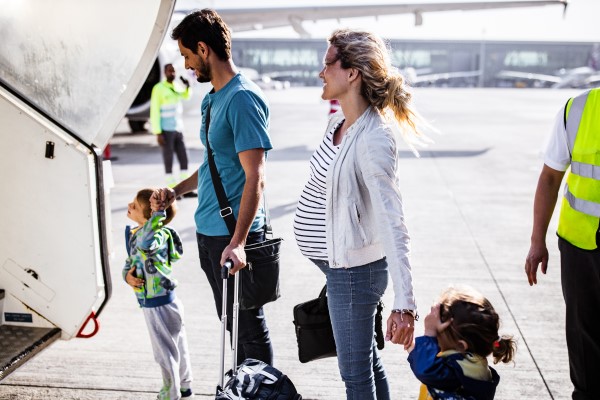Pregnancy and travel
Taking time out to travel before giving birth is a great way to relax and unwind. However, there are some things to consider to ensure everything goes according to plan – especially when it comes to air travel in pregnancy. While every pregnancy is different, being armed with the right information means you can usually travel well into your pregnancy. Read on for our tips for a smooth-sailing experience when travelling while pregnant.
Is travelling while pregnant safe?
Whether you’re heading off on a road trip or going overseas, some prefer not to travel while pregnant during the first trimester. This is because you are more likely to experience nausea and fatigue symptoms in the first 12 weeks of pregnancy.
As long as you aren’t experiencing any complications, the best time to travel while pregnant may be during your second trimester. This is the period when most women experience less nausea, and there is a lower risk of complications1.
Travelling in your third trimester can be challenging as it’s common to experience symptoms like fatigue, aches and pains2 – which could put a dampener on your holiday, and even present some health risks. Make sure you speak to your doctor before combining pregnancy and travel, especially if you plan on flying while pregnant.
Is air travel in pregnancy safe?
If you are considering flying while pregnant, your doctor or obstetrician will likely have their own recommendations for you. While ultimately the decision will fall to you personally, it’s worth speaking to a medical professional before booking in an interstate flight or deciding to fly internationally while pregnant.
Each airline will also have its own policy about people who will be flying pregnant, so it’s best to check these details before booking your flight. You’re more likely to go into labour after 37 weeks3, so while there may be no issues flying in the first trimester, some airlines won’t let you fly in the later stages of your pregnancy.
If you plan on flying after week 28 of your pregnancy, you may be required to provide a letter from your doctor or midwife that shows your due date and explains that you are not at risk of any complications.
Pregnancy travel alternatives: Cars and trains
If air travel in pregnancy is off the table – especially flying internationally while pregnant – then you may still be able to enjoy all the attractions Australia has to offer via car or train travel.
Many people experience fatigue and dizziness when travelling while pregnant. If you’re journeying by car it’s important to make frequent stops along the way, stay hydrated and stretch your legs regularly. Always wear a seatbelt and ensure the cross strap sits at the centre of your chest while the lap strap is placed under your bump.4
Things to be aware of with pregnancy and travel
Pregnant people are at greater risk of contracting some illnesses5. So if your pregnancy travels will take you to locations where these might be present, it’s vital that you are careful about the food and drink you consume. Check if tap water is safe and avoid ice, salads, uncooked fruit and vegetables.
It’s also best to avoid risky holiday activities6 when travelling while pregnant – however fun they may be. For example, water-skiing, scuba diving to depths below 18 metres, horseback riding and high-altitude activities like hiking.
During the planning phase of your trip, make sure you check that your travel insurance covers pregnancy and includes COVID-19 benefits, and research the types of healthcare facilities at your destination.
Ensure vaccinations are up to date before travelling while pregnant
While being pregnant doesn’t make you more likely to catch COVID-19, there may be a higher level of health risk should you contract it.7 Make sure your COVID vaccinations are up to date, as well as any additional vaccinations you’ll need for travelling while pregnant. These may include:
- Influenza
- dTpa (diphtheria-tetanus-acellular pertussis)
These vaccinations are safe for pregnant women and are recommended if you’re travelling to a place where you are at risk. Be aware that some vaccines such as measles, mumps, rubella and chicken-pox are not recommended for pregnant women8. The influenza vaccine is safe for pregnant women who are travelling and is strongly recommended. Lastly, if you are travelling to a country where malaria is common, speak to your doctor about anti-malaria medications.
Pregnancy travel checklist: What to pack
In addition to packing all your clothing and entertainment for the trip, when you are pregnant you also need to pack anything you won’t have easy access to like you would at home. Especially if you are travelling to remote parts of Australia or different countries, we recommend preparing well beforehand.
Make sure you speak to your doctor or obstetrician in the lead-up to your trip and get them to give you a list of medical essentials to pack. Items on your pregnancy travel checklist might include:
- Medications to treat common pregnancy conditions like heartburn, thrush, constipation and haemorrhoids.
- Oral rehydration.
- Pregnancy multivitamins.9
While it’s always important to prepare well before a trip, travelling while pregnant requires careful planning in order to reduce the chances of any complications. Find out how Medibank Travel Insurance can help protect you and your pre-baby escape.

Health members save 15%.
Ready for your next adventure? Help protect your trip with award-winning Medibank Travel Insurance. Plus, if you're a Medibank health member you can save 15%.
Important things you should know: Limits, sub-limits, exclusions and conditions apply. This is general advice only. Medibank Private Limited, ABN 47 080 890 259, an Authorised Representative, AR 286089, of Travel Insurance Partners Pty Limited, ABN 73 144 049 230 AFSL 360138 arranges the insurance on behalf of the insurer. The insurer is Zurich Australian Insurance Limited ABN 13 000 296 640, AFSL 232507. Please consider your own needs and the Combined FSG/PDS to decide if this product is right for you. For information on the Target Market and Target Market Determinations, visit medibank.com.au/travel-insurance/help/
References
1 https://health.ucdavis.edu/obgyn/services/family-planning/trimester_loss.html
2 https://utswmed.org/medblog/third-trimester-discomfort/
3 https://www.betterhealth.vic.gov.au/health/servicesandsupport/overdue-babies
4 https://www.health.qld.gov.au/__data/assets/pdf_file/0017/150506/c-seatbelts.pdf
5 http://emog.com.au/avoiding-infections-in-pregnancy/
6 https://americanpregnancy.org/healthy-pregnancy/is-it-safe/activities-to-avoid-during-pregnancy/
7 https://www.healthdirect.gov.au/covid-19/pregnancy-and-covid-19
9 https://www.betterhealth.vic.gov.au/health/healthyliving/pregnancy-and-travel

